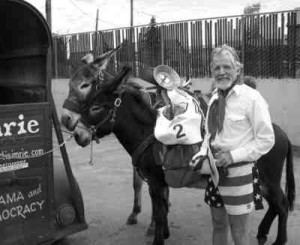Brief by Allen Best
Transportation – May 2008 – Colorado Central Magazine
The proposal to levy tolls from motorists using Interstate 70 between Denver and some mountain towns has riled the locals to an extent not seen in years.
From Steamboat Springs to Granby, and Idaho Springs to Eagle, it was a two-Tums case of indignation after State Sen. Chris Romer, a Democrat, and then Andy McElhany, a Republican, introduced legislation to begin tolling.
Romer’s bill got a lot of attention, but was shot down in the Colorado Senate Transportation Committee. McElhany’s bill, as of early April, remained alive, although it was not expected to survive additional legislative reviews. The bill proposes to levy a $5 toll at the Eisenhower Tunnel Complex.
“Premature at best and bad ideas at worst,” said the Summit Daily News in dismissing both bills.
With only McElhany’s toll proposal remaining, voices of opposition cited several overlapping reasons: First, the legislation would supersede a multiplicity of planning efforts launched in the last year since Gov. Bill Ritter took office. The first report is due this summer.
“Random politicians throwing spaghetti at this complicated wall only muddies the waters unnecessarily,” said the Vail Daily diplomatically in an editorial otherwise peevish in tone.
Second, mountain communities were not specifically consulted before the bills were introduced. “The bill was quite arrogant in the way it was presented to me, and no one was consulted from any of our district,” said Rep. Christine Scanlan, who represents the Breckenridge, Eagle and Leadville areas.
The third point of opposition is that tolls are not right — at least for this section of highway. It is not the only way between metropolitan Denver and some mountain communities, but all others involve major detours, in some cases requiring extra hours of travel.
Typical of the comments was Doug Monger, a commissioner in Routt County. “It’s a totally unfair solution,” he told his hometown newspaper. Added Diane Mitsch Bush, another Routt County commissioner: “It’s our lifeline. It’s our artery. It’s how goods get here.”
If the future of Interstate 70 is truly of statewide interest, then why shouldn’t the whole state pay for it, asked the Sky-Hi Daily News.
There is also distrust about how and where the money will be used. Transit supporters fear money will be spent to create more asphalt along I-70. Others fear money will be siphoned off to other transportation corridors, reported the Grand Junction Daily Sentinel.
“We don’t want Interstate 70 to become a cash cow for Interstate 25,” said former Gunnison County Commissioner Rikki Santarelli, who is now chairman of the Western Slope advocacy group Club 20.
An essential issue is lack of money. Colorado gutted its transportation funding to expand a section of Interstate 25 in Denver’s south-metro area, and any expansion of capacity will be far more expensive, likely to cost billions of dollars.
But while tolls are highly unpopular, many students of transportation say that they will become an essential source of transportation funding in the future. Simply put, the conventional means of highway funding, the gas tax, isn’t reaping what it used to, partly because of improved fuel efficiency of automotive fleets, but also because neither state nor federal taxes have been raised since 1992, notes ColoradoBiz Magazine in a story about Colorado’s transportation woes. During that same time, construction costs have soared.
“The unfortunate thing is the public really believes that the tooth fairy is going to show up and pay for these roads,” Romer told the Associated Press. He said he will continue to lobby through the summer on behalf of tolls that use congestion pricing and some other ideas that are currently unpopular.


